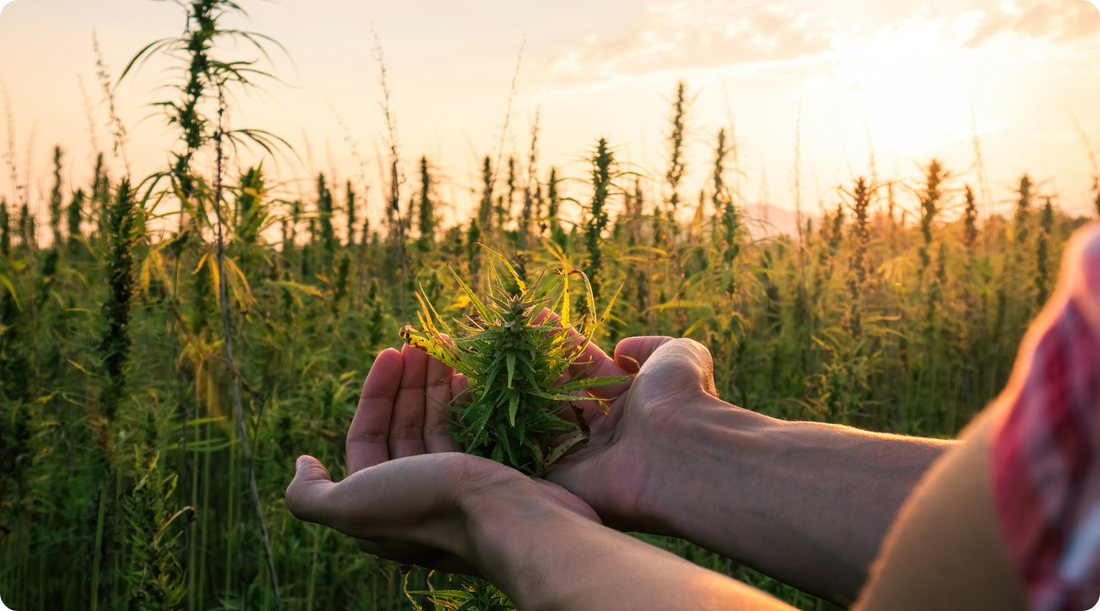
What is the Difference Between THCa and CBD?
Share
As cannabis continues to gain popularity in wellness and health circles, many people are becoming familiar with cannabinoids like THC and CBD. However, there are other important compounds found in cannabis and hemp plants, such as THCA (tetrahydrocannabinolic acid) and CBD (cannabidiol), that offer unique benefits. Although they come from the same plant family, THCA and CBD are very different in terms of their effects, benefits, and uses. In this article, we'll explore the key differences between these two compounds, their potential health benefits, and how they can be used in wellness routines.
What is THCA?
THCA is the precursor to THC, the psychoactive compound that most people associate with cannabis. THCA is found in raw cannabis or hemp plants, and it does not have psychoactive effects in its raw form. However, when THCA is heated—whether through smoking, vaping, or cooking—it undergoes a process called decarboxylation, converting it into THC. This is why raw cannabis does not produce a "high," but smoking or heating it does.
In its raw form, THCA is non-intoxicating, which means you won’t experience any mind-altering effects. Many people consume raw cannabis, through methods like juicing, to take advantage of the potential health benefits of THCA without the psychoactive experience that THC offers.
What is CBD?
CBD (cannabidiol) is another well-known cannabinoid found in both hemp and cannabis plants. Unlike THC (and even after THCA is converted to THC), CBD is non-psychoactive, meaning it does not produce a "high" at any stage. CBD interacts with the body's endocannabinoid system differently than THC or THCA, influencing receptors in the peripheral system rather than directly affecting the brain.
CBD has become extremely popular in recent years due to its wide range of therapeutic benefits, including anxiety reduction, anti-inflammatory effects, and pain relief. It is available in various forms, including oils, tinctures, edibles, and topical applications, and is commonly used in health and wellness products for humans and pets alike.
Key Differences Between THCA and CBD
While both THCA and CBD are cannabinoids, their effects and potential health benefits are quite different due to how they interact with the body. Below, we explore the major differences between these two compounds:
1. Psychoactive vs. Non-Psychoactive
-
THCA:
THCA is non-psychoactive in its raw form. However, when it is heated, it converts to THC, which is psychoactive and produces a "high." -
CBD:
CBD is non-psychoactive at all stages. No matter how it is consumed, it does not result in any mind-altering effects.
2. Health Benefits
-
THCA:
Early studies and anecdotal evidence suggest that THCA may have various health benefits, including:- Anti-inflammatory properties: THCA is believed to help reduce inflammation in conditions like arthritis and autoimmune diseases.
- Neuroprotective benefits: THCA may support brain health and protect neurons, potentially useful for conditions like Alzheimer’s or Parkinson’s.
- Anti-nausea: THCA has shown potential in reducing nausea and stimulating appetite, especially in patients undergoing treatments like chemotherapy.
Since THCA is not as widely researched as CBD, these benefits are still being studied, but initial findings are promising.
-
CBD:
CBD has been extensively studied, and its health benefits are well-documented. Some of the key benefits include:- Anxiety and stress relief: CBD is known to have calming effects, making it useful for managing anxiety and stress disorders.
- Pain relief: CBD is commonly used for chronic pain conditions such as arthritis, migraines, and fibromyalgia due to its anti-inflammatory and analgesic properties.
- Anti-seizure properties: CBD has been approved as a treatment for certain forms of epilepsy, such as Dravet syndrome and Lennox-Gastaut syndrome.
- Sleep support: Many people use CBD to promote better sleep, especially in cases of insomnia.
CBD is often regarded as a therapeutic option for a wide range of conditions, from mental health issues to physical pain.
3. How They Interact with the Body
-
THCA:
THCA primarily interacts with the body's CB2 receptors, which are located throughout the immune system. This interaction makes it especially useful for anti-inflammatory and immune system-related benefits. THCA does not readily bind to CB1 receptors in the brain unless it is decarboxylated to THC, which is why it does not produce a psychoactive effect. -
CBD:
CBD does not directly bind to CB1 or CB2 receptors like THC or THCA. Instead, it influences the endocannabinoid system by regulating how the body produces and breaks down its own endocannabinoids. CBD can also interact with other receptor systems, including serotonin and TRPV1 receptors, which is why it has such a broad range of effects, from mood regulation to pain relief.
Uses of THCA and CBD
Both THCA and CBD can be used for wellness purposes, but they are often used in different ways depending on desired effects:
-
THCA Use:
THCA is commonly used in its raw form to avoid intoxication while still reaping potential anti-inflammatory and neuroprotective benefits. People consume raw cannabis through juicing, tinctures, or by using raw hemp flower. It is also found in some topical products for localized relief. -
CBD Use:
CBD is widely used in various products such as oils, capsules, topicals, edibles, and beverages. It is often taken for its anti-anxiety, anti-inflammatory, and pain-relieving benefits. CBD products are available over the counter in many places and are commonly used in daily wellness routines.
Conclusion
While both THCA and CBD are cannabinoids with health-promoting properties, they differ significantly in their effects and uses. THCA is non-psychoactive in its raw form but converts into THC when heated, making it a unique compound with anti-inflammatory and neuroprotective benefits. CBD, on the other hand, is non-psychoactive at all times and is widely used for its calming, pain-relieving, and anti-anxiety effects.
Understanding the differences between these two compounds can help you make informed decisions about which is right for your health and wellness goals. Whether you're looking for the non-intoxicating benefits of THCA or the therapeutic properties of CBD, both offer exciting potential in the world of natural remedies.
Disclaimer:
The information in this article is intended for educational purposes only and is not a substitute for professional medical advice. Always consult a healthcare provider before using any cannabinoids, especially if you have pre-existing health conditions or are on medication.
